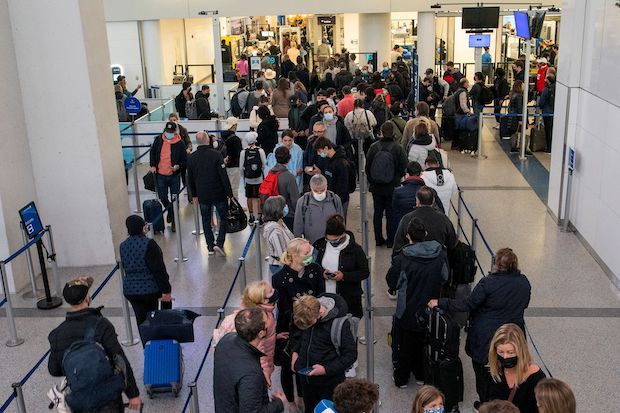US and other countries tighten travel rules over Omicron as EU urges vaccination

Passengers wait in line inside the terminal at Newark Liberty International Airport in Newark, New Jersey, US, Nov. 24, 2021. (File photo from REUTERS)
WASHINGTON/PARIS — Air travelers to the United States will face tougher COVID-19 testing rules to try to slow the spread of the Omicron variant, while other countries tightened border controls as a European leader urged all concerned to “prepare for the worst.”
A World Health Organization official said 24 countries may have reported cases of the variant so far but that some of the early indications were that most cases were mild, with none severe. Travel bans had consequences, he said, but there would be more mutations without other measures to contain its spread.
Staving off Omicron while scientists establish how easily it can spread and whether it can evade vaccine protection is a “race against time” the president of the European Union’s executive Commission said, emphasizing the role of vaccines.
“Prepare for the worst, hope for the best,” Ursula von der Leyen told a news conference, adding that according to scientists, full vaccination and a booster shot provide the strongest possible protection.
Ghana, Nigeria, Norway, Saudia Arabia, and South Korea were among the latest countries to report cases of the variant. Britain reported 22 cases so far, a number it said would certainly go up.
Article continues after this advertisementAustralia said at least two people visited several places in Sydney while likely infectious and Denmark said an infected person had taken part in a large concert.
Article continues after this advertisementJapan, which had already barred all new foreign entrants, reported its second case of the new variant and said it would expand travel restrictions.
Such curbs have become more tangled as they have spread.
Hong Kong added Japan, Portugal, and Sweden to its travel restrictions while Uzbekistan said it would suspend flights with Hong Kong as well as South Africa. Malaysia temporarily barred travelers from eight African countries and said Britain and the Netherlands could join the list.
The World Health Organization (WHO) said “blanket travel bans will not prevent the international spread and they place a heavy burden on lives and livelihoods” while advising those unwell, at-risk or 60 years and over and unvaccinated to postpone travel.
Global shares came off lows plumbed on Tuesday after remarks by the CEO of Moderna raised questions about the efficacy of COVID-19 vaccines against Omicron.
Health officials have since offered reassurances and said it is very likely vaccines will still prevent people from getting seriously ill.
European Medicines Agency Executive Director Emer Cooke said laboratory analyses should indicate over the next couple of weeks whether the blood of vaccinated people has sufficient antibodies to neutralize the new variant.
BioNTech’s CEO said the vaccine it makes in a partnership with Pfizer was likely to offer strong protection against severe disease from Omicron. The European Union brought forward the start of its vaccine rollout for five-to-11-year-old children by a week to Dec 13.
Britain and the United States have both expanded their booster programs in response to the new variant, which has highlighted the disparity between massive vaccination pushes in rich nations and sparse inoculation in the developing world.
Some 56 countries were reportedly implementing travel measures to guard against Omicron as of Nov. 28, the WHO said.
WHO head Tedros Adhanom Ghebreyesus said he was concerned that several member states were “introducing blunt, blanket measures”, which “will only worsen inequities”.
Global spread
South Africa first reported the variant a week ago, but data from elsewhere already shows it was circulating before then although Nigeria said a case from October it had initially reported as Omicron had in fact been the Delta variant.
In Germany, which is battling a surge in COVID-19 infections and deaths, officials said four fully vaccinated people had tested positive for Omicron in the south but had moderate symptoms.
The United States is moving to require all air travelers entering the country to show a negative COVID-19 test performed within one day of departure, the Centers for Disease Control and Prevention (CDC) said on Tuesday.
The new one-day testing requirement would apply to US citizens as well as foreign nationals.
The CDC lists about 80 foreign destinations as having “Level Four,” its highest level of COVID-19 transmission, and discourages Americans from traveling to those destinations.
In Asia, Japan said it would expand its entry ban to foreigners with resident status from 10 African countries.
Global airlines are preparing for more volatility.
Japanese airlines ANA and JAL said they were suspending new reservations for international flights to the country until the end of December.
“It feels a little bit like we are back to where we were a year ago and that’s not a great prospect for the industry and beyond,” Deidre Fulton, a partner at consultancy MIDAS Aviation, said at an industry webinar.